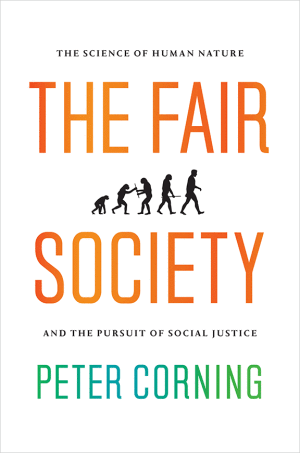@ University of Chicago Press, 2011.
ABSTRACT
 From the taxpayer bailouts for Wall Street banks to offshore tax havens for billionaires and subsidies for wealthy farmers, life is obviously unfair. But as Peter Corning shows in The Fair Society, we have the power to change this for the better.
From the taxpayer bailouts for Wall Street banks to offshore tax havens for billionaires and subsidies for wealthy farmers, life is obviously unfair. But as Peter Corning shows in The Fair Society, we have the power to change this for the better.
Corning sees fairness as a fundamental issue in all of our social relationships. It requires us to balance the needs and interests of all concerned. He believes we need to make fairness a guiding principle in our families, our communities, in the workplace, and in our politics.
In light of the emerging science of human nature, Corning defines fairness in a new way. The evidence confirms that most of us do have an innate sense of fairness, though it can easily be subverted by cultural, economic, and political influences, not to mention the lure of our self-interests. In the extreme, a pattern of unfairness can lead to social turmoil and even revolution.
Corning argues that both capitalism and socialism fail the fairness test — both in theory and in practice — and he calls for a new social contract based on three complementary fairness principles: equality in relation to our basic needs, equity (or merit) in relation to our personal efforts and accomplishments, and reciprocity – an obligation for everyone to contribute a fair share in return for the benefits they receive from society.
Corning also proposes a set of transformative economic and political reforms that would move us toward the ideal of what he terms a Fair Society, including full employment and a “basic needs guarantee” for all of our people, a shift in our economic system toward stakeholder (versus shareholder) capitalism, a strong effort to promote cooperative, not-for-profit community development and, not least, a life-long community service ethic that would include a year or two of national service for all who are able to do so.
A fair society, Corning concludes, is the key to our future as a secure, stable, and successful nation.
PRAISE FOR THE FAIR SOCIETY
“Peter Corning paints a compelling picture of the excessive inequalities of income, wealth, and power in American society, and the damage they cause. More importantly, he makes a strong case for fairness—arguing that equality, equity, and reciprocity are central to humanity’s social needs and collective flourishing.”
— Kate Pickett, coauthor of The Spirit Level: How Greater Equality Makes Societies Stronger
“This important and topical volume offers a policy perspective that differs from both socialism and conventional capitalism…The current economic crisis should prompt us to look for new solutions, and this book outlines an attractive and viable alternative to the flawed economic systems that dominated the twentieth century.”
— Geoffrey Hodgson, Research Professor in Business Studies at the University of Hertfordshire (England).
“For decades now economic policy has been driven by a peculiar and un-scientific view of human nature, namely, that people everywhere and at all times are selfish and perfectly rational utility maximizers…For years now Peter Corning has not only pointed out the fallacies in the standard economic model, he has presented concrete alternatives. His latest book is his most complete statement yet of a science-based economic policy framework consistent with the latest findings from behavioral economics and neuroscience. This book will make a real difference in how policy makers look at the world.”
— John M. Gowdy, Rittenhouse Professor of Humanities and Social Science, Department of Economics, Rensselaer Polytechnic Institute.
“Peter Corning’s voice is an echo of those rarely heard since the Golden Days of Greece. His advocacy for a return to the first principles from which a just society surely derives immediately identifies the huge distance which our practices have strayed from the ancient ideal. He argues that a new enlightenment, a new comprehensive moral platform might arise from human nature, and from a universal common needs approach. It is richly informed by modern science. This book approaches scripture in its reach and pertinence.”
—Walter Bortz, M.D., Professor, Stanford Medical School, past president, American Geriatrics Society.
“A clear, rational and clarifying voice in these troubled times, with a compelling vision of a fair society. I am truly grateful.”
—Constance Hellyer, Co-founder, Northwest Trek Wildlife Park, Eatonville, Washington.
“An edifying book. . . . I admire Corning’s attempt to develop a normative theory of justice that is ‘built on an empirical foundation.’ . . . One hopes that those who wish to occupy places of power on behalf of the 99 percent will heed Corning’s sage advice about what to do and—just as important—what not to do in planning for a better, more just society.”
— American Scientist
Table of Contents
- Preface
- Life is Unfair
- The Idea of Fairness
- A Brief History of (Un)Fairness
- Fairness and the Science of Human Nature
- Human Nature and Our Basic Needs
- Why Capitalism and Socialism are Unfair
- Toward a Biosocial Contract
- The Future of Fairness: The Fair Society
- Epilogue: What Can I Do?
Contact
For more information, please contact Peter Corning.
